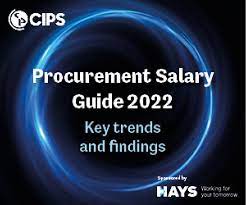
CIPS Procurement Salary Guide 2022 confirms value of Namibian procurement and supply professionals

The Chartered Institute of Procurement & Supply (CIPS) Procurement Salary Guide 2022 for Sub-Saharan Africa paints a clear picture of just how valuable procurement and supply professionals have become to organisations in an increasingly volatile and uncertain world.
As the war in Ukraine rages on, inflation spikes, energy, and fuel costs rise, and new supply chain disruptions overshadow post-pandemic marketplace recovery, so the strategic function of procurement in mitigating the impact of these challenges has become greatly valued, the report indicates.
Namibia is no exception, and professionals’ stock will only continue to rise in the coming years.
This follows the European Union signed a memorandum of understanding with the Namibia government in November to form a strategic partnership in the green energy sector.
The MoU, signed on the sidelines of COP27 in Egypt, is intended to increase the development of a raw material supply chain over and above renewable hydrogen.
Importantly, local value addition has been prioritised in the form of developing mining and renewable hydrogen value chains – a huge opportunity for those in the already-thriving procurement sector.
The CIPS Procurement Salary Guide 2022: Sub-Saharan Africa shows just how vital supply and procurement professionals have become to countries in the territory.
Dr. Sara Bux, Managing Director of the Chartered Institute of Procurement & Supply (CIPS) for Southern Africa, shared that 81% of those surveyed for the 2022 Procurement Salary Guide in the Sub-Saharan regions believe the perception of procurement has improved in the past year, with 79% saying they feel valued within their organisation while being engaged from the time a project starts (77%).
The Salary Guide published by CIPS in partnership with global recruitment and human resources multinational Hays, the report provides valuable insights into trends in the procurement profession based on survey findings of over 7,000 industry role players from around the world.
Notably, in Sub-Saharan Africa, the appreciation of procurement and supply chain management professionals’ role is increasingly reflected in their salaries, one of the factors monitoring how much the profession is valued in the country. This year, 49% of respondents received a pay rise in the past 12 months – an increase on last year’s 40% – while 69% received a bonus in the past 12 months.
The average annual salary for all procurement and supply professionals in the region is now $43 703, up from $34,677 in 2021. At the top end of the scale, advanced professionals are earning $82,964 a year.
Despite a challenging economic environment, such buoyancy and resilience in salaries are encouraging and reflect the increasing status and value of the procurement function.
Bux also points out that 82% of respondents feel that directors and heads of departments understand the value procurement brings to their organisation, both at a strategic and talent level.
The positive sentiment in the sector means there has never been a more opportune time for procurement professionals to grow and flourish.
“The light the pandemic has shone on the strategic importance of procurement has also highlighted the skills needed to thrive in the role and drive further value,” Bux says.
“Excellent negotiation skills underpin successful procurement and are rated as key by employees. It is also the skill most in demand from hiring managers. Ensuring your organization provides training in negotiation skills will not only be important for retaining talent but is also key to tackling the challenges that lie ahead for the profession.”
Procurement professionals are acutely aware of these challenges.
Fifty percent of those surveyed believe managing risk in the supply chain will be crucial, while the same percentage considers budgeting restraints to be a potential hurdle. Managing costs while maintaining quality (45%), recovery from the pandemic (44%), and monitoring suppliers’ sustainability practices (34%) also feature among 2022’s challenges.
In terms of the profession itself, Bux is concerned about the gender pay gap. “Improved salaries are heartening, but the gender pay gap remains – and has indeed widened this year to 7% (from 1% in 2021). There is still much work to be done to eliminate it.”
“The end of the year is upon us and we are all looking forward to a well-deserved break. Make 2023 a year of growth by brushing up on essential skills for procurement professionals. View our 2023 Skills Training Calendar and start booking now,” advises Bux.











































